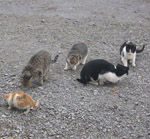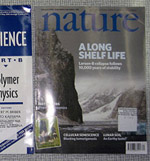Fed up conservation workers organize

In California, conservation workers are venturing into new territory: labor organizing. In the aftermath of a 7+ month state bond freeze that left the industry reeling: a group of conservationists has launched the Association of Conservation Contractors and Workers (ACCW) - an organization that aspires to be a mix between a trade association and a union.
Environmental groups have been known in the past to join forces with organized labor to fight for common causes such as promoting the green economy. However, cases of conservation workers organizing themselves to build cohesion and clout are rare.
The Californian bond freeze dealt a severe blow to the conservation sector cutting off the flow of an estimated $2billion of funding allocated for existing projects. By not paying its bills the state forced organizations to lay off workers, cut staff time, and put contracts on hold. The ordeal served as a wake-up call for conservation workers and contractors by pointing out their vulnerability.
“The landscape has made people say there’s a shifting beneath our feet”, said Ariana Katovich from the Earth Island Institute who sits on the association’s twelve-member steering committee. To her, because people in conservation are not known as an ornery bunch - “we’re nice people,” she says - it’s just too easy for officials to ignore or marginalize them. Organizing is a “good old-fashioned answer” to this flaw.
Katovich and the other founding members of the ACCW got the cue back in March from a Service Employees International Union (SEIU) representative whom they had invited to attend a workshop at a salmon conference in Santa Cruz. While they were discussing the bond freeze and how to respond to it, the labor organizer got up and offered his advice:
“You environmentalists, you are great people, but you don’t know the first thing about organizing! And you’re being taken advantage of because of that. There’s a reason why the state government would never pull this with road contractors."
The next morning, over breakfast, the ACCW steering committee was formed.
One of the questions surrounding the ACCW is what role the association will ultimately play. Their adopted mission statement states that they will "support and advocate for conservation workers and the organizations that employ them." However, associations such as the California Council of Land Trusts already exist to advocate for the interests of the sector. What may distinguish the ACCW, though, is the prospect of utilizing union-based strategies such as collective action and grassroots organizing.
For now, the ACCW is building its base. Members are reflecting on the association’s structure and bylaws. So far, approximately 50 individuals representing their organizations have signed on, the membership being free for the time being.
One of ACCW’s strategies is to maintain the dialogue that the crisis elicited. “With the bond freeze, restoration practitioners got out of their little watershed or creek system, and started a conversation”, said Katovich. People have been exchanging experience about their requirements when they work with an agency, about getting paid back out of grants. ACCW hopes to establish standards in drafting contracts that conservation workers can rely on when money starts flowing again. According to Katovich, “there are contracts that organizations have signed with government agencies that I don’t think any for profit business in their right mind would sign!”. She wants to make sure people are protected.
ACCW’s intends to probe its own constituency and measure the crisis’ outcome. “It wasn’t until the freeze happened that we realized how far-flung and diffuse our community was”, said David Simpson, ACCW’s project coordinator. The conservation field evolved in a decentralized manner. Organizations, many of which are citizen-run, are so scattered that the impacts of the budget stalemate remain to be assessed. How many individuals were laid off as a result? How many organizations went belly up? How many projects were stalled to a point of no return? By tracking the extent of those losses, ACCW will unveil how local economies were affected. “I think people do not realize statewide or nationwide how big the place-based conservation movement is”, said Mr Simpson.
In telling this story, ACCW aims to do its part in advocating for a restoration economy. “We have to raise the profile of restoration as the green economy”, confirmed Katovich. She deplored that when people talk about green collar jobs, they think solar panels and windfarms, when wetlands sequester more carbon than forests. She was shocked, for instance, when a state Treasurer assistant came up to her after a Pooled Money Investment Board meeting and told her that her best bet to get paid back was to do private bond placements, because the restoration sector was the last priority for the state of California. “So I was told to my face that our work is considered the lowest priority. We work on water. Water is the lowest priority for the state of California!”
Even though April and March’s $6.85 billion record bond sales did signal the end of the freeze, ongoing since Dec. 17, 2008, more trouble is brewing. Despite the Department of Finance’s promises of restored funding for the future, some agencies have told their partner organizations that the money for new programs won’t start to flow until 2011.
So the freeze is over, but the freeze is not over, concluded Mr Simpson. ACCW will help conservation workers brace themselves for this predicament. This latest initiative may well mark a new era in the California conservation movement.
--by Cecile Lepage
ACCW contact info: accw.california@gmail.com




 Economics
Economics
Reader Comments